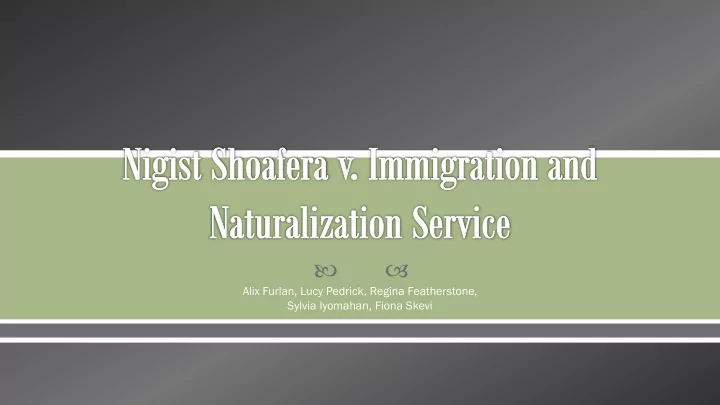

Alix Furlan, Lucy Pedrick, Regina Featherstone, Sylvia Iyomahan, Fiona Skevi
Facts Timeline Background Legal Question Majority Opinion: o Applicable Rules o Court’s findings Dissenting Opinion Evaluation
Pa Partie ties: Nigist Shoafera (petitioner) v. Immigration and Naturalization Service (respondent) Countr ntry of origin gin: Ethiopia Countr ntry of claim: USA Ethn hnic icity ity of pet etitioner itioner: Amharic (Ethiopian) Cause se of flight ght: Fear of persecution (rape by Belay, a Tigrean Ethiopian government official)
We are here Appeals Application Files asylum rejection to De Novo rejected by Appeal claim in the Board of Appeal before Immigration rejected US Immigration the 9 th Circuit Judge (IJ) Appeals (BIA)
Shoafera’s testimony was credible Relied upon : “Persecution is defined as ‘the infliction or suffering or harm upon those who differ (in race, religion, or political opinion) in a way that is regarded as offensive” (Prasad v INS 1995 ) Therefore rape ‘may constitute persecution’ Past suffering clearly proven, but not the persecutory nexus Additional question of whether there is legitimate fear of future persecution There was also an alternative motive proposed: that the accused persecutor raped Shoafera because he found her ‘attractive’
Has Shoafera established that she was raped as a result of her ethnicity as an Amharic Ethiopian? Is there a persecutory nexus?
An alien must show that he or she is a refugee within the meaning of 8 US Code § 1101(a)(42)(A): (A) “any person who is outside any country of such person’s nationality or, in the case of a person having no nationality, is outside any country in which such person last habitually resided, and who is unable le or unwilli lling g to return eturn to, and is unable le or unwilling lling to avail himself mself or herself self of the protection ection of, that country because of persec secution ution or a well-foun ounded ed fear of persec secution ution on account of race, religion ligion, nati tionality nality, members mbership hip in a p parti ticula cular social al group up, or politic itical al opinio nion ” A well-founded fear of future persecution may be established by proving either past persecution or 'good reason' to fear future persecution." Navas v. INS, 2000.
Aguilera-Cota v. INS, 1990: "Asylum applicants are not required to produce documentary evidence" to support their claims of persecution. "It is difficult to imagine what other forms of testimony the petitioner could present other than his own statement .” Sangha v. INS, 1997: Also, "because asylum cases are inherently difficult to prove, an applicant may establish his case through his [or her] own testimony alone. ” Shoafera's uncontroverted and credible testimony is sufficient to establish that she was persecuted on account of ethnicity. + Her sister also testified that Belay raped Shoafera because she is an Amhara + Shoafera submitted documentary evidence which verified the ongoing ethnic conflict in Ethiopia and established that Amharas are often targets of such violence.
Based on Shoafera's credible testimony and the testimony of her sister, and the materials she furnished, the BIA concludes that Shoaf oafera era was persecu secuted, ed, in part, t, beca cause se of her r Am Amhara hara et ethnic hnicit ity. A finding of past persecution triggers a regulatory presu sumpti tion on that the applicant has a well- founded fear of future persecution. To rebut this presumption, the INS must show, "by a preponderance of the evidence, that 'since the time the persecution occurred conditions in the applicant's country . . . have changed to such an extent that the applicant no longer has a well-founded fear of being persecuted if . . . [she] were to return .” The BIA did not consider Shoafera's application in light of the presumption created by past persecution, the BIA’s decision is remanded. The BIA is confined to examining the existing record to determine whether the INS has carried its burden of rebutting the presumption.
There is no substantial evidence to suggest the testimony was credible o Difference between credible evidence and substantial evidence We cannot assume Shoafera’s testimony is credible regarding the motive behind the rape o The fact of the case suggest that she was raped because she was an attractive woman, not because of her ethnicity
Under the current state of the law…: But what if…? Motive in rape Crawley o Harm + state failure Standard of proof Rape as power rather than sex o Substantial o Credible Influence of the perpetrator Persecutory nexus Standard of proof too high? Inherent complexity of asylum If the policy was tightened up, evidence possibly the majority would be Probably the dissent was correct correct; potentially then a ‘policy judgment’?
Recommend
More recommend